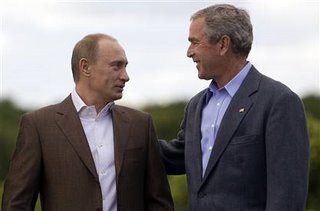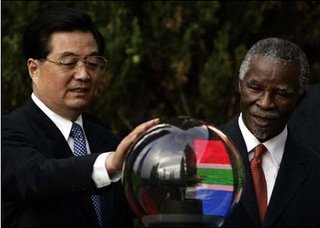Moreover, they take great pride in juxtaposing this “paternalistic” American approach to dealing with them with the strategy the Chinese and Russians are pursuing, which primarily entails establishing joint-venture partnerships and forging long-term economic ties.
But, truth be told, these intelligent and proud Africans seem to relish the marginalization of Americans on the Dark Continent. And frankly, their sentiments are entirely understandable.
Nevertheless, I fear that the wholesale rejection of American political interest (and largesse) in favor of Chinese or Russian pecuniary interests does not bode well for Africans. And the Chinese cuddling of the oppressive regime in Sudan, which has the blood of hundreds of thousands of Africans in Darfur on its hands, should be a red flag in this respect.
It is in this context, therefore, that I feel obliged to publish this update on Cold War II:
 This summer US President George W Bush invited Russian President Vladimir Putin to be the first foreign leader to visit his family’s hallowed compound in Kennebunkport, Maine. And in doing so he made it abundantly clear that he still sees in Putin’s eyes the soul of a Jeffersonian democrat. Although, he probably scheduled the visit for the July 4 weekend to help imbue Putin with the spirit of independence that inspired Thomas Jefferson to draft the abiding tenets of America’s Declaration of Independence.
This summer US President George W Bush invited Russian President Vladimir Putin to be the first foreign leader to visit his family’s hallowed compound in Kennebunkport, Maine. And in doing so he made it abundantly clear that he still sees in Putin’s eyes the soul of a Jeffersonian democrat. Although, he probably scheduled the visit for the July 4 weekend to help imbue Putin with the spirit of independence that inspired Thomas Jefferson to draft the abiding tenets of America’s Declaration of Independence.
But almost from the day in 2001 when Bush first vouchsafed that Putin is “a democrat and friend”, Putin has behaved – at home and abroad – more like a neo-Stalinist than a bona fide democrat. In fact, in a series of related articles (see below), I have chronicled his unabashed efforts to wield totalitarian powers while curtailing the democratic freedoms that his predecessor, Russia’s true Jeffersonian democrat – Boris Yeltsin, pushed to codify in a new constitution in 1993.
Most notably, in a March 2005 article entitled President Putin reforming Russia in his own image, I coined the phrase “the putinization of Russia” to describe what appears to be his pathological determination to reconstitute the old Soviet Union. And nothing has confirmed my diagnosis in this respect quite like Putin’s iron-fisted attempts to dominate former satellite states (e.g. by trying to influence the outcome of democratic elections in the Ukraine and threatening to cut off critical supplies of Russian gas to extract financial and political concessions from Georgia).
But never mind my indictment against Putin; because what made Bush’s unprecedented invitation to him so disappointing, if not hypocritical, is the fact that only a year ago, Bush dispatched VP Dick Cheney to Putin’s doorstep in Vilnius, Lithuania to deliver a similar indictment, which I heartily endorsed in an article entitled Cold War Redux: Friendship over between Russia and the United States.
Nevertheless, if the putinization of Russia were not sufficient to convince Bush that he’s hell-bent on reclaiming Russia’s superpower status, then Putin’s efforts to re-establish Cold-War ties with African leaders should be dispositive in this respect. After all, one of the more cynical and indelible features of the historic bipolar struggle between the US and USSR was their amoral strategy of inducing Third World countries – with lots of cash and military hardware – to parrot their ideological world view.
Therefore, those of us who are acutely mindful of Putin’s global agenda took heed last September when he became the first Russian leader to visit Africa’s most influential country, South Africa. And there Putin vowed to end “the decades-long interruption in ties between South Africa and Russia”. More importantly, however, Putin used this vantage point to assure all African leaders, many of whom (including South African President Thabo Mbeki) studied communist ideology and received military training as communist revolutionaries in Russia during the Cold War, that he intends to seal their bond this time around with sustainable financial partnerships instead of mere rhetorical comradeship:
The level of our economic co-operation is totally out of line with the political trust and confidence we’ve had over recent years.
 Meanwhile, it shall be recorded in the annals of history as a profoundly ironic fact that – despite being hailed as the world’s sole superpower – America’s sphere of influence in the world today is even less than it was at the height of the Cold War. And nowhere is this more evident than in Africa, where China, not the US, is the superpower adversary Russia will have to compete with for joint-venture partners….
Meanwhile, it shall be recorded in the annals of history as a profoundly ironic fact that – despite being hailed as the world’s sole superpower – America’s sphere of influence in the world today is even less than it was at the height of the Cold War. And nowhere is this more evident than in Africa, where China, not the US, is the superpower adversary Russia will have to compete with for joint-venture partners….
But really, how can Bush be concerned about fighting a new cold war against Russia (and/or China) when he has a very hot war on terror to fight against al Qaeda….
Related Articles:
President Putin Reforming Russia in his own image
Putinization of Russian extends to Georgia
Cold War Redux: Friendship over between Russia and the United States
Vladimir Putin, George Bush, Cold War
Leave a Reply
You must be logged in to post a comment.